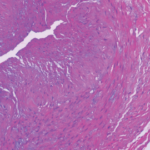Treatment Implications
“The clinical, take-home point of our study—and other studies that have failed to demonstrate a role for the varicella zoster virus in the pathogenesis of GCA—is that antiviral therapy, either as adjunctive or primary treatment, has no current role in the management of GCA,” Dr. Padera says.
He notes decades of clinical experience have demonstrated the effectiveness of glucocorticoid treatment for GCA and the prevention of its most feared complication: the loss of sight.
“An important goal in GCA research is the continued focus on identifying additional strategies for reducing patient exposure to glucocorticoids and their potential side effects,” Dr. Padera says. Other recent research has shown adjunctive treatment with tocilizumab can reduce total glucocorticoid doses during the course of treatment for GCA.5
Carina Stanton is a freelance science journalist based in Denver.
References
- Gilden D, White T, Khmeleva N, et al. Prevalence and distribution of VZV in temporal arteries of patients with giant cell arteritis. Neurology 2015;84:1948–1955.
- Solomon I, Docken WP, Padera RF Jr. Investigating the association of giant cell arteritis with varicella zoster virus in temporal artery biopsies or ascending aortic resections. J Rheumatol. 2019 Dec;46(12):1614–1618.
- Sammel AM,Smith S,Nguyen K,et al. Assessment for varicella zoster virus in patients newly suspected of having giant cell arteritis. Rheumatology (Oxford). 2019 Nov 27. pii: kez556.
- Ostrowski RA, Metgud S, Tehrani R, et al. Varicella zoster virus in giant cell arteritis: A review of current medical literature. Neuroophthalmology 2019 Jul 2;43(3):159–170.
- Stone JH, Tuckwell K, Dimonaco S, et al. Trial of tocilizumab in giant cell arteritis. N Engl J Med. 2017 Jul 27;377(4):317–328.

